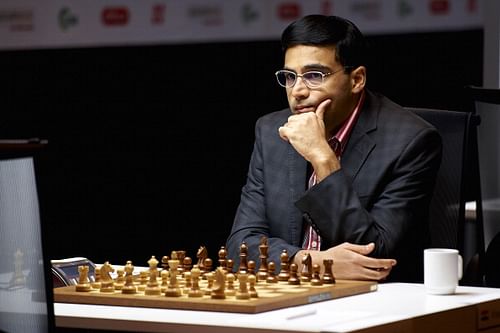
Viswanathan Anand: A victim of his own hubris?

Viswanathan Anand
On hindsight, it seems apparent that Viswanathan Anand should have taken more of an initiative at the very outset of his world championship match with Magnus Carlsen in Chennai. He quickly forced a draw with black pieces in the first game, and then opted for a queen exchange and another quick draw when Carlsen surprised him with the Caro Kann defence in the second game. Even in the third game, which seemed to be developing into the sort of complexity in the middle that Anand relishes, he chose a risk-free line when a pawn sacrifice was offered.
Carlsen appeared uncharacteristically vulnerable in that first quarter of the championship. But Anand could not pounce on that unexpected vulnerability, because his own strategy was to put safety first, and avoid risks. In fact, from game four onwards, he seemed quite willing to be drawn into long end games, which is known to be Carlsen’s strength.
A five-time world champion does not play like that, especially at the start of a championship, unless that is what he had planned. Even at the end, after everything had gone horribly wrong, Anand never admitted that his risk-free strategy was wrong; he only said he had failed in its execution.
So what could Anand have been thinking?
Carlsen is not too hot on opening theory, nor does he set much store by complicated middle games with too many pieces. His preferred route to a kill is an endgame that stretches for hours until his victim succumbs to relentless pressure or makes a mistake out of sheer mental exhaustion.
But what if somebody as good as Anand could withstand that pressure and not make mistakes in endgame after endgame? Would it then be Carlsen who would eventually get frustrated and crack, or be forced to try a different tack where he is less sure of himself ?
For somebody who has been world champion for so many years, it is natural to back oneself to concentrate and play error-free chess, especially in the simplified positions of an endgame, however long it stretched. Why should the world champion be the one to open himself to counterattack by risky play in the middle game, while the challenger sat back and played solid, safe chess?
Ultimately, Anand was a victim of this self-belief. He did not take his age or fitness into account. He also discounted his erratic play in the last year or so, and Carlsen’s immaculate record for over two years during which he was rated the No.1 player in the world. If he had factored all that in, he would have happily risked going into uncharted territory in the middle game when Carlsen deliberately made sub-optimal moves to disturb Anand’s prepared lines of play. In fact, he came close to beating Carlsen only in Game 9 when he went on a risky all-out attack in desperation.
Anand may still have lost if he had taken more risks from the beginning, but at least his strategy would have reflected selfawareness, rather than being in denial about the reality of his own age and his rival’s No.1 status. The deposed champion has won hearts over the years with his humility, but may have succumbed to his own hubris in the end.